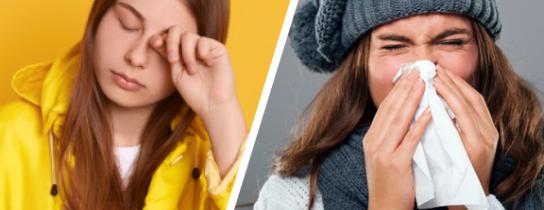
Differences Between Spring & Fall Allergy Triggers
As winter ends and the spring months come ushering in, many allergy sufferers begin their annual struggle with classic allergy symptoms. The allergists at Crystal Run Healthcare are ready to treat all of your allergies, no matter what their cause. Common allergy symptoms include:
- sneezing
- runny nose
- nasal congestion
- itchy, watery eyes
- itchy throat
Although the symptoms of spring and fall allergies are the same, the specific culprit or allergen is different.
Seasonal Triggers
A person can, unfortunately, have seasonal allergies in both the spring and fall. We can thank the trees local to our Hudson Valley area such as Oak, Ash, Beech, and Birch, among others, for creating the beautiful yellow coating we see on our cars at the end of every spring day. Formally known as tree pollen, it can be carried for miles. If we have a mild winter in the Northeast, the spring allergy season and pollen spread can start earlier.
In the late spring and summer, as the trees give us some reprieve, allergens known as grass pollens start to circulate. Grass pollens such as Kentucky Blue Grass, Timothy and Orchard become prevalent. Unfortunately, that idyllic scent that travels through the air after mowing the grass often brings on an allergy or asthma attack.
As we head into the fall months, fall allergy symptoms are predominantly the result of weed pollens, such as Goldenrod and Thistle. These usually continue to produce symptoms until the first frost. Fall rains can also ramp up mold and fungi spores, adding another potential trigger for allergies.
Managing Your Seasonal Allergies
Managing your seasonal allergy symptoms starts with controlling the environment to avoid exposure to your allergy triggers. When it comes to your home, keep windows closed when possible, especially during high pollen count days, and vacuum frequently with a vacuum that has a HEPA filter to keep the inside as free from allergens as possible. Limit your time outside and consider wearing a mask when gardening or mowing to cut down on pollen exposure. You may want to even shower frequently to remove allergens from your body and hair.
Over-the-counter medications can help as well. Some steroid and antihistamine nasal sprays, daily non-sedating antihistamines as well as antihistamine eye drops are available without a prescription to help with nasal tissue swelling, rhinorrhea (runny nose), and eye allergy symptoms.
Seek an Evaluation from an Allergy & Immunology Specialist
If you are uncertain of your allergy triggers, you should consult an allergy and immunology specialist. While both blood testing and skin testing are available, skin testing is considered the gold standard by which we would evaluate your seasonal allergies, and what we use to create an immunotherapy schedule, should you require “allergy shots.” If you schedule an appointment for an evaluation, please stop taking antihistamines for at least 7 days prior to coming as these can interfere with skin testing.
Gina L. DiCostanzo, ACNP-BC, is an Allergy & Immunology Nurse Practitioner at Crystal Run Healthcare. She completed her Master of Science degree in Nursing at University of Connecticut in Storrs, CT. She is a Board Certified Nurse Practitioner and her clinical interests include allergy, dermatology, urgent care, and geriatrics. Gina is seeing patients at Crystal Run Healthcare in West Nyack.

 Optum Radiology at Crystal Run Healthcare
Optum Radiology at Crystal Run Healthcare Same and next-day pediatric appointments
Same and next-day pediatric appointments